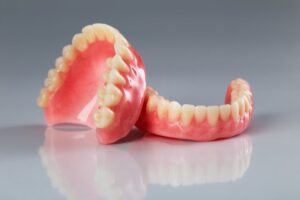
Losing natural teeth doesn’t just change your smile—it can also impact how you eat, and ultimately, your nutrition. Dentures are a common solution for tooth loss, restoring the ability to chew and improving appearance. But while dentures help many people regain oral function, they can sometimes affect what you eat and how well your body absorbs nutrients. Understanding this connection can help you make healthier choices and get the most out of your dentures.
How Dentures Influence Eating Habits
Dentures are designed to mimic natural teeth, but they don’t always provide the same chewing power. Especially in the first few weeks, many patients find it challenging to eat certain foods, which may lead to avoiding them altogether. Crunchy fruits, fibrous vegetables, nuts, and lean meats—all important sources of vitamins, minerals, and protein—can be difficult to chew with dentures. Over time, this may result in a diet limited to softer, more processed foods that are higher in starch and sugar but lower in essential nutrients.
Nutritional Risks Linked to Dentures
Reduced Fiber Intake
High-fiber foods like raw vegetables, whole fruits, and whole grains are harder to chew with dentures. A lack of fiber can lead to digestive issues such as constipation and reduced gut health.
Lower Protein Consumption
Dentures can make it more difficult to chew meats, nuts, and seeds, which are rich in protein. Since protein is vital for maintaining muscle mass and healing tissues, a deficiency can negatively impact overall health.
Vitamin and Mineral Deficiencies
When denture wearers avoid crunchy produce, they may miss out on vitamins A and C, calcium, and antioxidants, all essential for immune health, bone strength, and healing.
Increased Reliance on Processed Foods
Soft, processed foods like white bread, pasta, and desserts are easier to eat with dentures, but they often lack nutrients and can contribute to weight gain and blood sugar spikes.
Tips for Eating Well with Dentures
Choose Softer Alternatives
If certain foods are difficult to chew, find softer versions that provide the same nutrition. For example, steamed vegetables, fruit smoothies, or shredded chicken can replace harder-to-chew options.
Cut Foods into Small Pieces
Slicing fruits, vegetables, and meats into smaller pieces makes them easier to chew with dentures and reduces the risk of discomfort or slipping.
Try Different Cooking Methods
Cooking foods until tender—whether by steaming, roasting, or slow-cooking—can make nutrient-rich ingredients easier to enjoy without sacrificing flavor.
Practice and Adjust
It takes time to get used to eating with dentures. Practicing with different foods and working with your dentist for adjustments can improve comfort and expand your food options.
Dentures do affect nutrition, but with the right approach, you can still enjoy a balanced, healthy diet. Being mindful of food choices, preparing meals in denture-friendly ways, and focusing on nutrient-rich options will help you maintain your health while adjusting to life with dentures.
About the Author
Dr. Frank J. Sapienza is a second-generation dentist with more than 30 years of experience in the field. He is a 1985 graduate of the New York University College of Dentistry and continues to pursue ongoing education and training, staying current in the field with memberships in the American Dental Association, the Dental Society of the State of New York, and the Second District Dental Society. Trust Dr. Sapienza and our expert team to provide you with restoration in the form of durable dentures! Schedule an appointment online or call our Brooklyn office at (718) 965-6298.

